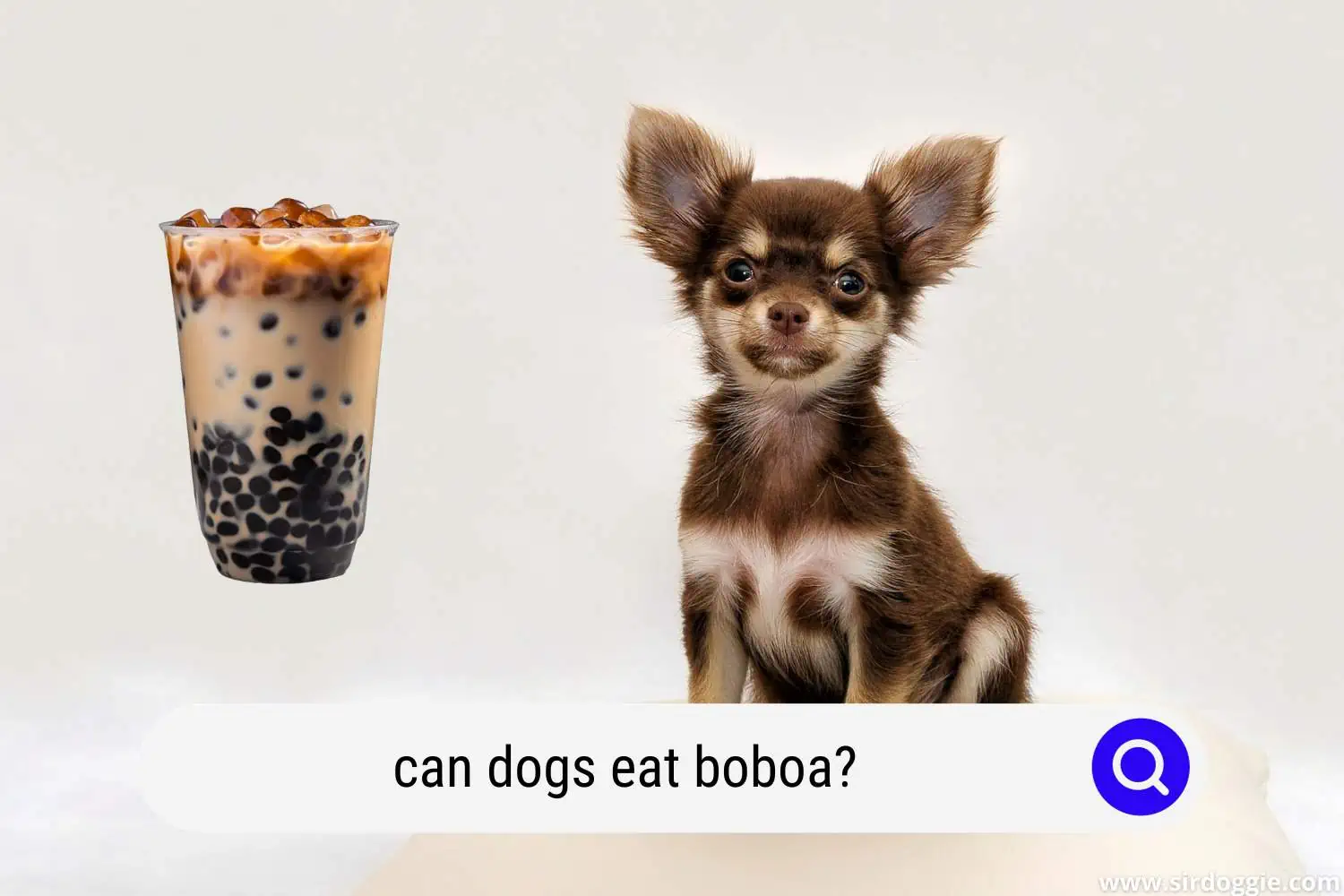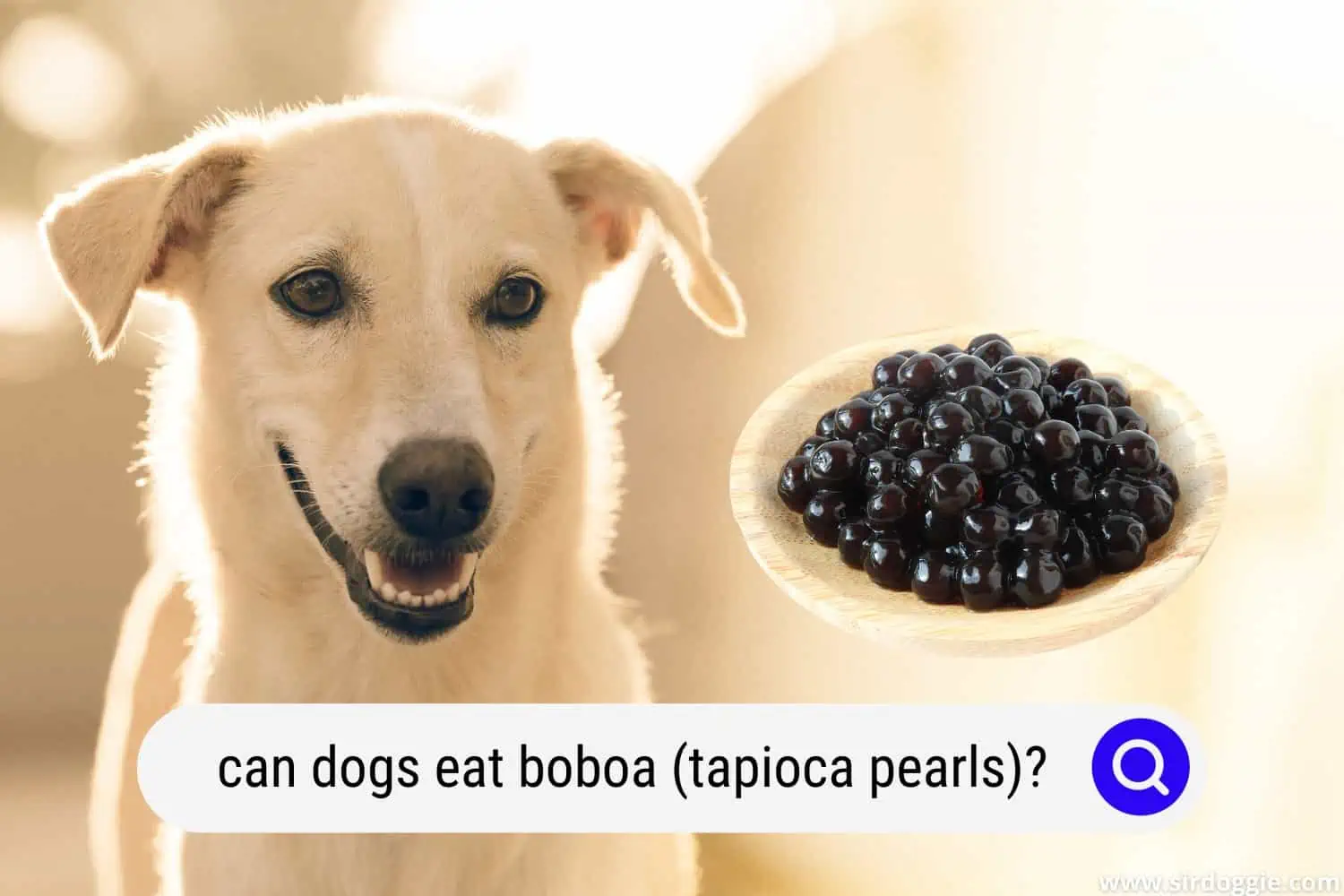Can Dogs Eat Boboa (Tapioca pearls)?
Boboa, also known as bubble tea, pearl milk tea, and bubble milk tea, is a type of tea drink that originated in Taiwan in the early 1980s. This tasty beverage consists mainly of tea and chewy tapioca balls, known as boboa or pearls, and comes in a variety of flavors and mixtures, ranging from passion fruit, mango, almond, coconut, cantaloupe, and grape.
Most people might think that pearls, or boboa, is the reason that boboa tea is also called bubble tea, but it’s called bubble tea due to the appearance of bubbles in the milk and tea blend after shaking. If you are enjoying a day out with your dog, and happen to catch a boboa tea at a local cafe, you may wonder can dogs eat boboa?

If you are wondering if your dog can eat boboa, the answer is no. However, boboa is not toxic or poisonous to your dog, but eating too much can cause some gastrointestinal (GI) upset. Veterinarians do not recommend feeding people food to dogs, and since boboa consists of carbohydrates and lots of sugar, it doesn’t offer any nutritive value for your dog. If your dog has a few tastes of your boboa, you don’t need to be too worried. But if your pup overdoes it on boboa pearls, she may experience some GI signs such as gas and diarrhea, and in extreme cases, may experience an intestinal obstruction.
What is Boboa?
Boboa or Tapioca Pearls consist of small pearl-shaped balls made from starch extracted from the cassava root and almost look like little spheres of gelatin. These chewy pearls are basically all carbohydrates, and the actual drink is made from a tea base mixed with milk and different flavorings. One serving of boboa tea can contain up to 50 grams of sugar, and the actual drink is made from a tea base mixed with milk and sugary flavorings. Boboa teas are made with a multitude of tea varieties including black, green, chai, or jasmine teas, and are a popular refreshing drink, however, these teas are packed with sugar and not necessarily good for your dog.
Related Reading: Can Dogs Eat Sweet Tarts?
What ingredients are in Boboa Tea?
Dog owners may want to know what exactly is in boboa tea, and if any ingredients are harmful to dogs. Below is a list of ingredients in bubble teas.
- Tea. Tea by itself is not generally poisonous or toxic for dogs, however, it’s the caffeine in tea that poses a health threat to your pooch. Most teas have caffeine in them, and caffeine contains the substance theobromine, a chemical also found in chocolate. Theobromine is poisonous to dogs, and symptoms of caffeine poisoning in dogs include hyperthermia, tachycardia, vomiting, seizures, and collapse.
- Boboa Tapioca Pearls. Since the pearls are made from the starch of the cassava root, it’s not exactly poisonous or toxic for dogs but too much of it can cause stomach ache or intestinal problems.
- Milk. Dogs are in general lactose intolerant, meaning that they lack the enzyme lactase that metabolizes the main sugar (lactose) in dairy products. This means that they cannot adequately digest milk, and as a result develop GI symptoms such as bloating, diarrhea, and vomiting.
- Sugar. Boboa teas contain cane sugar or corn syrup, and although sugar is not toxic for dogs, if your dog has too much sugar, it can lead to obesity and tooth decay.
- Flavored syrups. Most boboa teas contain a thick, flavored concentrate infused into the tea to give it a fruity flavor, such as banana or strawberry, and these flavored syrups pack a lot of sugar. Also, artificial sweeteners can be toxic to your dog, especially Xylitol. It only takes a little taste of Xylitol to cause a dangerous drop in your dog’s blood sugar levels, and this can cause seizures and possibly death. Never give your dog anything flavored with artificial sweeteners.
Is Boboa Bad for My Dog?
Some people are wary of boboa. In July 2019, Singapore’s Mount Alvernia Hospital issued a warning regarding the sugar content of bubble tea since the drink is very popular in Malaysia. Although the benefits of drinking black tea and green tea are well known, the hospital alerted the public to the other ingredients such as non-dairy creamers, sugary syrups, and additional toppings, all of which add fat and sugar. Non-dairy creamers are also a concern as they contain trans fat in the form of hydrogenated palm oil, and trans fats have been tied to increased risk of stroke and heart disease.
Although boboa is not necessarily harmful to your dog, the starch and sugar in these tasty pearls can become a health concern. Just as trans fats, high-fat foods, and sugars are not healthy for humans in large amounts, they are also equally unhealthy for your dog. Veterinarians recommend avoiding feeding your dog too many high sugar and high carbohydrate foods such as boboa as they offer empty calories, and can lead to weight gain, elevated blood sugar levels, and tooth decay.
What Do I Do If My Dog Eats Boboa?
If your pup happens to have a nibble or two of boboa, you need not be too concerned. However, the bigger problem is the tea. As mentioned above, many teas such as black tea do contain caffeine, which is toxic to dogs. If you choose to share a boboa pearl or two with your dog, it should not be an issue, but just remember that boboa is pure starch and offer no real nutritional value to your dog.
What Do I Do If My Dog Drank My Boboa Tea?
If you suspect that your pooch has ingested some of your bubble tea, first take note of what kind of tea. If your tea contains caffeinated green tea or black tea and has ingested a good amount, contact your veterinarian as soon as possible. You can also take note of the symptoms of caffeine poisoning such as elevated temperature (hyperthermia), rapid heartbeat, and vomiting. If you notice any of these symptoms, take your dog to the veterinarian right away. Emergency veterinary staff can help guide you and offer “phone triage” to get a better idea of your pet’s signs and symptoms.
You can also contact several pet poison helplines such as the Pet Poison Helpline (800) 213-6680, or the ASPCA Animal Poison Control Center (888) 426-4435 for any animal poison-related emergency. These hotlines operate 24/7, but a consultation fee may apply.
Why Shouldn’t My Dog Eat Boboa?
Although boboa is not toxic to your dog, and your pup might like its chewy texture, it only provides empty calories for your dog. An occasional nibble is fine, but veterinarians discourage dog owners from sharing human food with their pets. The reason is that the body systems of dogs are different from ours, and there are certain foods and chemicals that they cannot digest, and some (such as caffeine) can be toxic to our best friends.
Also, if eaten in large amounts, the boboa pearls can cause a possible GI obstruction in your dog. Symptoms of a GI obstruction include vomiting, not being able to keep down water or food, lethargy, and abdominal pain. If you suspect an obstruction in your dog, contact your veterinarian immediately, as this is a medical emergency and may require surgery to remove the obstruction.

Final Thoughts
If you and your best friend are out and about and stop at a cafe for a refreshing bubble tea, plan ahead and pack some dog treats. You can still enjoy your tea, and if your pup is hankering for a snack, you can offer her a dog biscuit or treat instead. It’s better to be safe than sorry, so skip the boboa pearls and stick to doggy treats.

Family Dog Expert Author
Hi there! I’m Stuart, a devoted dog lover and family dog expert with over a decade of experience working with our furry companions. My passion for dogs drives me to share my knowledge and expertise, helping families build strong, loving bonds with their four-legged friends. When I’m not writing for SirDoggie, you’ll find me hiking, playing with my beautiful dog, or studying music.